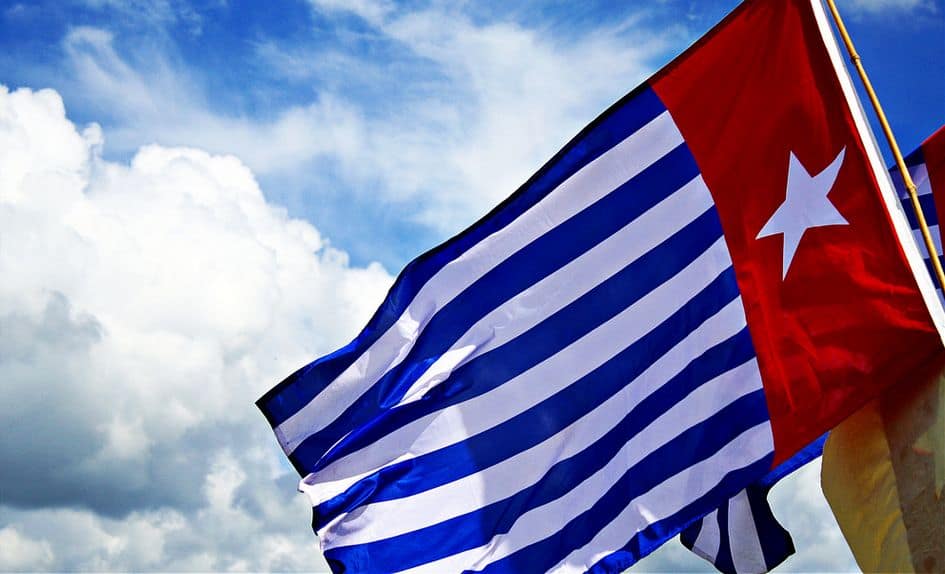Authorities in Papua New Guinea have clamped down on displays of the West Papuan independence flag ahead of the Indonesian president’s visit to the Pacific island country this week.
Papua New Guinea, which has a 760-kilometer (472-mile) border with Indonesia, is home to thousands of refugees from the Papuan provinces of its powerful neighbour, where an indigenous Melanesian independence movement and armed insurgency has simmered for decades.
Officers from Papua New Guinea’s National Intelligence Organisation (NIO) removed Morning Star independence flags and banners at the Rainbow refugee camp in the capital Port Moresby on Saturday. Supporters of Papuan self-determination were marking the 01 July anniversary of a decades-old proclamation of independence from Indonesia.
“We will not allow the raising of the West Papuan flag,” said one of the officers, who identified himself to BenarNews as from the National Intelligence Organisation. “But you can carry on with your programme,” the officer, who declined to give his name, told residents at the camp.
Indonesian President Joko Widodo will arrive in Papua New Guinea for a two-day visit on Wednesday, the Pacific island country’s government has said. Widodo was last in Port Moresby in 2018 for the Asia Pacific Economic Cooperation (APEC) leaders summit.
Indonesia, an archipelago nation of some 270 million people, is a rising Southeast Asian power that reaches into the South Pacific region and says it is on track to be the world’s fourth-largest economy by 2045. Its military, economy and population dwarfs Papua New Guinea’s.
In recent years, Indonesia has contributed aid and technical assistance to Melanesian nations in the Pacific including Papua New Guinea, Vanuatu, Fiji and the Solomon Islands in an attempt to counter criticism of lack of development and militarisation of its Papuan provinces. The region, which makes up the western half of the island of New Guinea, is referred to as West Papua in Pacific island countries and by supporters of independence.
The intelligence agency officers arrived at the refugee camp in Port Moresby in two unmarked white vehicles with tinted windows.
Their activities caused a commotion and some women and men cried as they sang the West Papuan national anthem in protest.
“Even if they remove our flag, they cannot remove us. We are the flag,” said Samuel Inggamer, a community leader. “I urge President Widodo to give us independence. He would make history if he did that.”
Vincent Manukayasi, director of civil society group PNG Trust, said the intelligence agency’s actions called into question the independence of a state institution.
“As a sovereign state, the NIO cannot be seen to be dictated to by another foreign government,” he said.
Poorly armed Papuan fighters – collectively known as the West Papua National Liberation Army – have battled Indonesia since the early 1960s, when it took control of the remote mountainous region from the Dutch.
Papuans, culturally and ethnically distinct from the rest of Indonesia, say they were denied the right to decide their own future. Indonesian control was formalized in 1969 with a UN-backed referendum in which little more than 1,000 Papuans were allowed to vote.
Documented and alleged killings and abuses by Indonesian military and police, from the 1960s until the present day – along with impunity and the exploitation of the region’s natural resources and widespread poverty – have fueled resentment of Indonesian rule.
Papuan liberation fighters have also become more unified and aggressive in recent years, stepping up attacks on Indonesian soldiers and civilians.
In a recent attention-grabbing raid, a rebel unit under Egianus Kogoya kidnapped New Zealand pilot Philip Mehrtens hoping to gain international exposure.
Within Papua New Guinea, there is a grassroots support for the Papuan independence movement in Indonesia. The Papua New Guinea government says it recognises Indonesia’s sovereignty over the territory.
After a decade’s delay, Papua New Guinea in March ratified an agreement governing its border with Indonesia, possibly opening the way to relieving a longstanding pressure point in relations.
Researchers say that Jakarta is concerned by the prospect of Papuan insurgents moving between both countries. Over the decades Indonesia itself has periodically made incursions into Papua New Guinea’s territory, deliberate and accidental, they say. Ahead of Widodo’s visit, Indonesia’s national airline Garuda, through its Citilink subsidiary, on Sunday began twice-a-week flights between Port Moresby and Denpasar, Bali.
